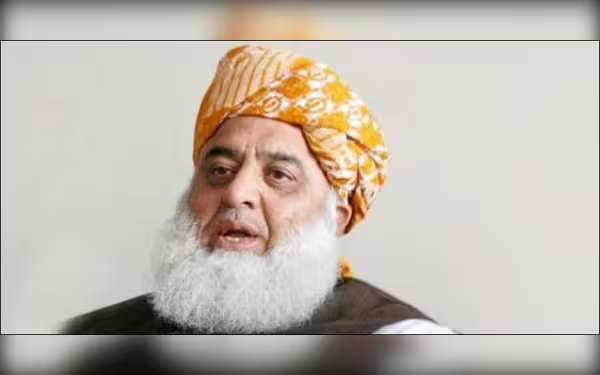Saturday, November 16, 2024 05:39 PM
Fazlur Rehman: Imran Khan's Release Unlikely Amid Political Uncertainty
- Fazlur Rehman doubts Imran Khan's imminent release.
- Public protests by PTI should not be restricted.
- Negotiations on 26th Constitutional Amendment show progress.
 Image Credits: thefrontierpost
Image Credits: thefrontierpostFazlur Rehman states Imran Khan's release seems unlikely, emphasizing the need for verified information amid ongoing political negotiations.
In recent developments surrounding the political landscape of Pakistan, Jamiat Ulema-e-Islam-Fazl (JUI-F) chief Maulana Fazlur Rehman has made it clear that the release of Imran Khan, the founder of the Pakistan Tehreek-e-Insaf (PTI), appears to be unlikely at this time. This statement comes amidst ongoing discussions and negotiations within the political sphere, highlighting the complexities and uncertainties that characterize the current situation.
While addressing the media in Wakefield, Fazlur Rehman stated, "The release of the PTI founder seems unlikely at the moment." His comments reflect a cautious approach to the evolving political dynamics, as he emphasized that he is not privy to any potential deals regarding Khan's release. "I am not aware of any deal with the founder of PTI; I cannot comment on hearsay," he added, underscoring the importance of verified information in political discourse.
Fazlur Rehman also responded to inquiries about his alleged involvement in securing bail for Imran Khan’s wife, Bushra Bibi, and his sisters, asserting that these cases were managed independently. He further articulated the public's right to protest, stating that PTI's demonstrations should not be curtailed, which reflects a commitment to democratic principles.
In a broader context, the JUI-F chief discussed the recent negotiations regarding the 26th Constitutional Amendment, noting that discussions had successfully reduced the draft from 56 clauses to 22. This reduction signifies a potential shift in legislative focus, which could impact various political agendas moving forward. Fazlur Rehman criticized the compromising nature of political parties, attributing it to the fragility of democracy in Pakistan.
Moreover, he expressed his support for a strong military, emphasizing that a robust army is essential for a secure Pakistan. This statement resonates with many who believe that national security is paramount in the face of various challenges. On the contentious issue of Kashmir, Fazlur Rehman remarked that the resolution now lies in the hands of the Kashmiri people, indicating a shift towards empowering local voices in the ongoing conflict.
Looking ahead, Fazlur Rehman announced public gatherings scheduled for the end of November in Sukkur and on December 8 in Peshawar, signaling an active engagement with the public. Earlier, a PTI delegation led by Asad Qaiser had sought a meeting with the JUI-F chief to discuss potential joint actions against the government. Although their initial request was denied, a subsequent agreement was reached, demonstrating the fluid nature of political alliances.
During their discussions, both parties agreed to reactivate existing parliamentary committees and consider launching a joint movement against the government. They also discussed the importance of reaching out to other opposition parties, with JUI-F suggesting that PTI must demonstrate seriousness if they wish to collaborate effectively in the future. In response to questions about future plans, PTI indicated that they would consult with their founder, Imran Khan, and their top cadre before proceeding.
As the political landscape continues to evolve, the interactions between PTI and JUI-F may play a crucial role in shaping the future of governance in Pakistan. The ongoing dialogue reflects a broader trend of political maneuvering, where alliances and strategies are constantly reassessed. For citizens, staying informed about these developments is essential, as they will undoubtedly influence the direction of the country in the months to come.













